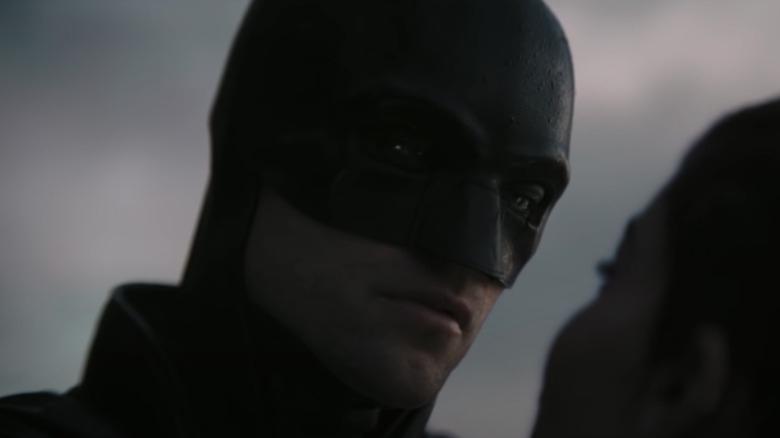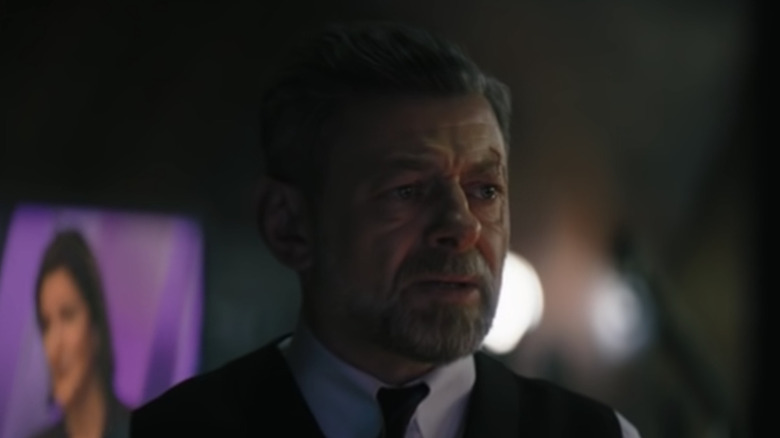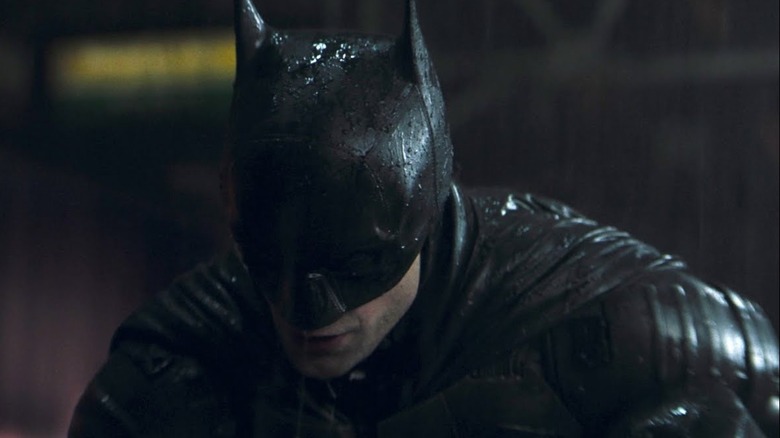In The Batman, One Scene Stands Above The Rest
"The Batman," director Matt Reeves' vision for the Caped Crusader, is finally here, and its grounded, gritty, crime thriller approach seems to be sitting very well with critics and audiences alike. The film places fans early on in the story of Batman — his second year fighting crime in Gotham City. Right at the beginning of the movie, we discover that Bruce still hasn't quite figured out exactly who he wants to be as Batman, although he still seeks vengeance on criminals for the tragedy in his own life. "The Batman" then quickly moves to focus on the Riddler (Paul Dano) and his one-man killing spree of Gotham City officials as Batman and James Gordon (Jeffrey Wright) frantically try to solve his riddles and get one step ahead.
The entirety of "The Batman" is filled with incredible scenes as Bruce, Gordon, and Selina Kyle (Zoë Kravitz) cross paths with the likes of the Penguin, aka Oswald "Oz" Cobblepot (Colin Farrell) and Carmine Falcone (John Turturro) while attempting to stop the Riddler's plans. There are brutal fights, Batmobile chases, BASE jumping scenes, exploding heads, and intense conversations between Batman and the Riddler. Ultimately, "The Batman" ends with the Riddler having blown the support walls that are keeping water from flooding the city. Therefore, Bruce assists in saving people from the disaster as Batman — after beating The Riddler's thugs profusely, of course. Ultimately, Bruce decides that he wants to be Batman and wants to be a man who inspires hope, not vengeance.
Although it's almost too hard to narrow, given the quality of action-packed and emotional scenes in "The Batman," there is one particular moment that stands above the rest.
Bruce talking to Alfred in the hospital is The Batman's best scene
During the middle of the film, Batman and Gordon have recently discovered that Bruce Wayne is the Riddler's next potential victim. Alfred (Andy Serkis) is nearly killed in the process and hospitalized. Bruce continues his investigation while Alfred heals, and a revelation from the Riddler points to his father, during his mayoral campaign, seeking help from Carmine Falcone to murder a journalist who was threatening to leak a story about his wife Martha's mental health issues. Bruce confirms this with Carmine, leading to a truly excellent confrontation with Alfred when he wakes up from his injuries.
Bruce proceeds to accuse Alfred of lying to him about his parents and tells him that he knows Thomas sought out Carmine, that he wasn't a good man like Alfred insisted. However, Alfred explains that Thomas was indeed a good man, albeit one who made a poor decision in a moment of weakness and desperation trying to protect his family. In fact, Thomas was going to turn Carmine in to the authorities, but he and Martha were killed first. Bruce then pieces together that Carmine likely had his parents killed, and is apologetic toward Alfred, noting that he felt fear for the first time in a while, knowing he could lose someone he cares about.
This scene is the best in the entire movie because the interaction between Alfred and Bruce is so raw and emotional, we are able to see the bond between two men who have gone through immense trauma. It's also one of the few times we see Bruce be truly vulnerable.
Fans are able to see a vulnerable Bruce Wayne who still feels fear
It's no secret that Batman always has his guard up. Not often are we able to truly see Bruce Wayne in a vulnerable state, much less in a position where he admits to feeling fear, as that is the main tool that he uses against those who would do evil. That's why it's so important that we were able to witness Bruce come to the realization that he will always still feel fear when it comes to the people that he holds close, even with his immense mastery over the feeling. Bruce seems to realize that fear can never truly be eliminated, only overcome. This interaction offers him a chance to slow down and consider more of who he wants to be, who he wants Batman to be, and how he wants to continue pursuing the Riddler.
Not to mention, this conversation between Alfred and Bruce is truly the only time the deaths of Bruce's parents are discussed openly. Alfred notes that Bruce was only a boy, and although Bruce blamed himself, Alfred was the one who felt responsible — even explaining that he felt like he couldn't be the father Bruce needed. This scene just provides much-needed healing between two broken characters, only assisting in the realization Bruce comes to at the end of the film about what he wants Batman to stand for.
Although it's a close call, and there are many expertly crafted and acted sequences in "The Batman," this hospital bed scene perfectly gets to the core of Bruce's struggle as a man and as Batman.


